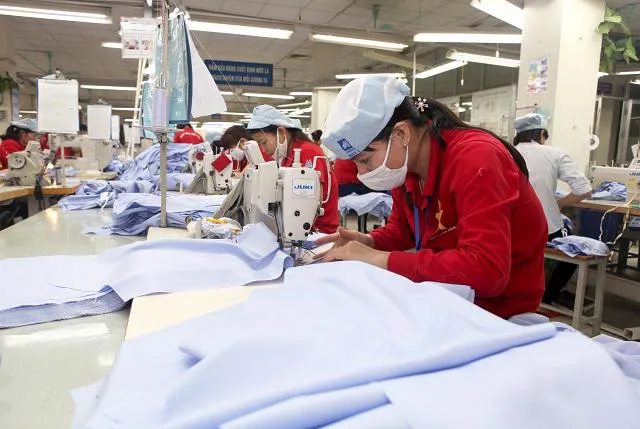High expectations for Vietnam Gov’t’s renewed drive for SOEs restructuring
Expert calls for Government agencies to refrain from intervening in corporate governance activities of state firms.
The Government’s latest proposal on restructuring state-owned enterprises (SOEs), focusing on major economic corporations in the 2021-2025 period, is seen as the right step to deal with weaknesses, and protect and expand state capital in the state sector.
| Garment 10 Company has been one of the successful examples of privatization. Photo: Thanh Hai |
Statistics from the Ministry of Planning and Investment (MPI) revealed SOEs' combined asset value is estimated at VND4,000 trillion (US$175 billion), of which each has an average registered capital of VND4.1 trillion ($180 million), 10 times higher than that of foreign-invested enterprises and 109-fold higher than domestic private businesses.
The state sector posts a return on equity of 10.46%, and a return on asset (ROA) of 4.87%, higher than the private sector; contributes 28% of total tax revenue and operates in key economic fields; accounts for 24.6% of total state investment capital and 12% of social investment.
During a recent Government meeting, Minister of Planning and Investment Nguyen Chi Dung acknowledged the fact that SOEs have not yet realized their roles as the engines for economic growth, and to create spillover effects to enhance the economy’s competitiveness.
“State-owned firms’ successes are only limited to a few sectors with considerable advantages, including mining, finance-banking, and telecommunications,” Dung said while referring to their weaknesses in competitiveness, IT application, and innovation.
Dung attributed the issues to slow improvements in corporate governance, and rigid operation mechanisms that have not been able to keep pace with the fast-changing nature of the business world.
On the other hand, the restructuring process of SOEs has left much to desire as it is mainly focused on divesting state capital, rather than seeking breakthrough solutions in terms of technologies, innovation, or long-term business strategy.
A lack of vision for development, especially in further integrating into the global value chains is also hindering SOEs from enhancing their competitiveness in domestic and international markets.
As the Government is pushing for the development of the business community, including private and state companies, Dung stressed the necessity to create a favorable legal framework for SOEs to continue thriving.
“The Government expects the SOEs to play a leading role in contributing to Vietnam’s independent, self-sufficient, and highly resilient economy,” Dung said.
Hoang Van Cuong, National Assembly Deputy and Vice President of National Economics University, called for greater efficiency in NA’s supervision activities of state capital utilization at SEOs.
“There should be a drastic change in the mindset of Government agencies on the position of state capital representatives at SOEs,” Cuong said, expecting state companies to fully operate under international practices and local laws, according to which the authorities should refrain from intervening in corporate governance at firms.
The Government’s proposal on SOEs restructuring in the 2021-2025 period targets to fully resolve loss-making projects and inefficient investments from SOEs. Under the plan, those having completed the privatization and state capital divestment should fully comply with requirements for a public listing, which is seen as a key step in ensuring transparency during the value evaluation process. SOEs are required to refrain from investing in non-core business lines, which could be done via an acceleration in state capital divestment. The Government would select a few SOEs in the post-privatization period to list in regional and international stock markets. In addition, the Government would continue to revise laws and regulations to address concerns of SOEs during the restructuring process to better reflect the actual situation. SOEs are required to enhance efficiency in corporate governance to stay in line with good international practices, along with pushing for innovation and hi-tech applications. The Government expects SOEs to play a leading role in their respective fields and set up value chains to create spillover effects for the economy. |













